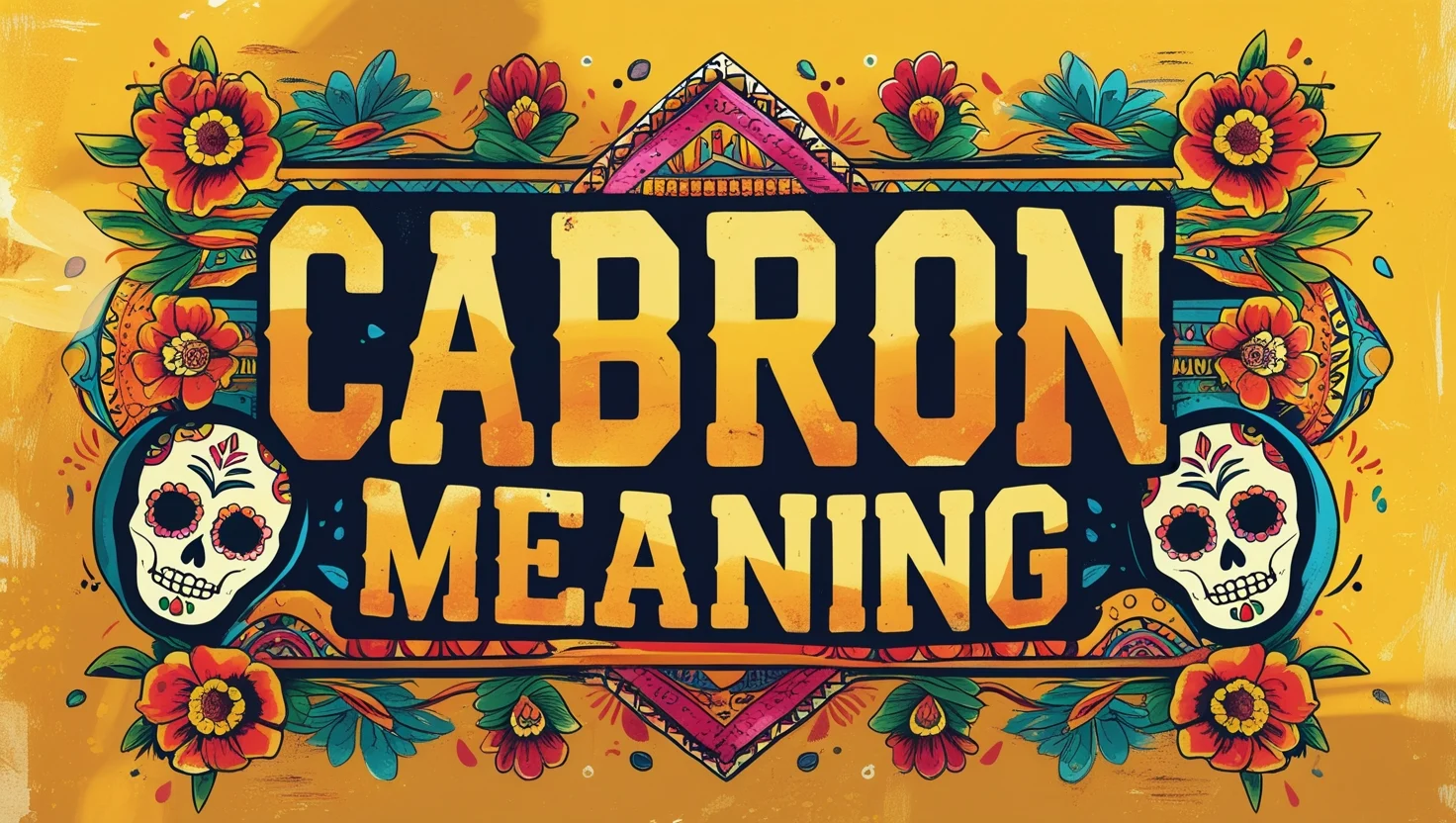In today’s world, where global cultures mix and online communication thrives, we often come across foreign words or slang that leave us puzzled.
One such word is “cabron.” You might see it used in casual conversations, movies, or text messages—but what does it really mean?
Whether you’re learning Spanish, exploring Hispanic culture, or just want to avoid accidentally offending someone, this article will guide you through the meaning of “cabron,” its nuanced usage, and professional or polite alternatives you can use depending on the tone and context.
Let’s break it all down clearly—no tables, no fluff, just real understanding in simple, engaging language.
💬 What Does “Cabron” Mean?
The Spanish term “cabron” (pronounced kah-BROHN) is a slang word with various meanings, depending heavily on tone, context, and location. It’s one of those words that can be an insult, a term of endearment, or even admiration—so you’ll need to read the room carefully before you try to use it.
✍️ Literal Meaning
Literally translated, cabron once referred to a male goat (or cabrón with the accent). But over time, it evolved into a colloquial expression across different Spanish-speaking cultures.
🔍 Cabron in Different Contexts
Here’s where things get interesting—and a bit tricky. The word “cabron” changes meaning depending on who says it, to whom, and how it’s said. Below are a few of its most common meanings:
1. Insult: “Jerk” or “Bastard”
In many Spanish-speaking countries, “cabron” is used negatively to refer to someone who is rude, dishonest, or immoral. It’s often the equivalent of “a–hole” or “bastard” in English. Not something you want to toss around carelessly.
📌 Example:
Ese tipo es un cabron.
(That guy is a jerk.)
2. Cheated-On Husband (Historical Use)
In older, more traditional uses, cabron referred to a man whose wife was unfaithful—making him a “cuckold.” This meaning is less common today but still found in certain literature or regional dialects.
3. Tough or Clever Guy (Admiration)
Among close friends, especially in Mexico, “cabron” can mean someone who is savvy, cool, or even badass. It’s like calling someone “a beast” or “a legend.”
📌 Example:
Ese cabron ganó la carrera sin entrenar.
(That badass won the race without training.)
4. Friendly Banter
Used in a humorous or lighthearted way, “cabron” is thrown around in friendly teasing, like how someone might say “you little devil!” in English. Tone is everything here.
📌 Example:
¡Qué cabron eres, siempre haces reír a todos!
(You rascal, you always make everyone laugh!)
🚨 Why You Should Be Cautious Using “Cabron”
Even if you’re trying to sound cool or casual, non-native speakers should be extra careful when using “cabron.” What’s playful in one setting can be deeply offensive in another.
Especially in professional or international contexts, using such a term could:
- Harm your reputation
- Offend someone without meaning to
- Be misinterpreted as rude or aggressive
So, if you’re not entirely sure how it will land, it’s better to opt for a safer alternative.
✅ 11 Polite, Professional, or Casual Alternatives to “Cabron”
Now that you understand what “cabron” means, here are 11 better ways to express what you want to say—without being offensive. These alternatives suit different settings, whether you’re joking with friends or keeping things respectful at work.
1. Jerk
A common English slang word, jerk is perfect when you want to call someone out for bad behavior without getting too vulgar.
📌 Example:
He took credit for my work again. What a jerk.
2. Rascal
“Rascal” is old-fashioned but playfully mischievous. It’s harmless and works well when teasing someone in a lighthearted way.
📌 Example:
You ate all the cookies? You little rascal!
3. Savage
Used positively in modern slang, savage can describe someone who’s bold, daring, or brutally honest.
📌 Example:
She shut them down with one line—total savage move!
4. Legend
To replace the admiration meaning of “cabron,” use legend—a term used to describe someone who is impressive or iconic.
📌 Example:
He fixed the car in five minutes—what a legend.
5. Smart-Aleck
A sarcastic but funny way to describe someone who’s clever with their words, often in a teasing manner.
📌 Example:
Don’t be a smart-aleck—just answer the question!
6. Trickster
Describes someone who is clever, sly, or cunning in a playful way. It captures the clever side of “cabron” without the sting.
📌 Example:
You managed to skip the meeting again? You trickster!
7. Player
This word often implies smooth-talking charm or romantic cleverness. It can be positive or negative depending on tone.
📌 Example:
He’s such a player—always knows what to say.
8. Sly Dog
A cheeky expression that shows admiration mixed with amusement. Works well among friends.
📌 Example:
You closed that deal already? You sly dog!
9. Bold One
When you want to compliment someone’s confidence or daring nature, “bold one” keeps it respectful.
📌 Example:
You walked in late with coffee in hand—bold one, aren’t you?
10. Bad Apple
If someone’s causing trouble, “bad apple” is a more polite criticism than calling them a cabron.
📌 Example:
Most of the team is great, but there’s always one bad apple.
11. Charmer
Use this to express cleverness in a flirty or persuasive way, without implying anything negative.
📌 Example:
He always knows what to say. That charmer!
🎭 How to Choose the Right Word
When selecting an alternative to “cabron,” consider these factors:
| Factor | What to Think About |
|---|---|
| Tone | Is it friendly, sarcastic, angry, or admiring? |
| Relationship | Are you talking to a friend, colleague, or stranger? |
| Setting | Is this a formal situation, a casual chat, or online? |
| Cultural Sensitivity | Is your audience familiar with the slang you’re using? |
🔑 Quick Tips:
- In formal settings: Use “bold one” or “bad apple” if you need to criticize politely.
- Among friends: Try “rascal”, “sly dog”, or “savage”.
- To admire someone: Go with “legend”, “charmer”, or “player” (used cautiously).
🙅♂️ Words You Should Avoid
While exploring slang, it’s just as important to know what not to say—especially if you’re planning to monetize your content, stay respectful in conversations, or maintain a professional tone. Avoid these:
- Obscenities or swear words
- Regional slurs or culturally sensitive terms
- Words with double meanings that could be misread
Words like “cabron” might be common in certain communities, but their meanings don’t always translate well—especially online, where your tone can’t always be heard.
✨ Final Thoughts
Language is powerful. A single word can express humor, admiration, insult, or frustration—depending on how and where it’s used. The Spanish word “cabron” is a great example of this complexity. While it can be funny or flattering in some circles, it can just as easily be rude or inappropriate in others.
If you’re learning Spanish, chatting with bilingual friends, or writing content for a wide audience, it’s smart to know the risks and have alternatives ready.
Use this guide to choose the right words, avoid misunderstandings, and keep your communication respectful, clever, and well-received.




